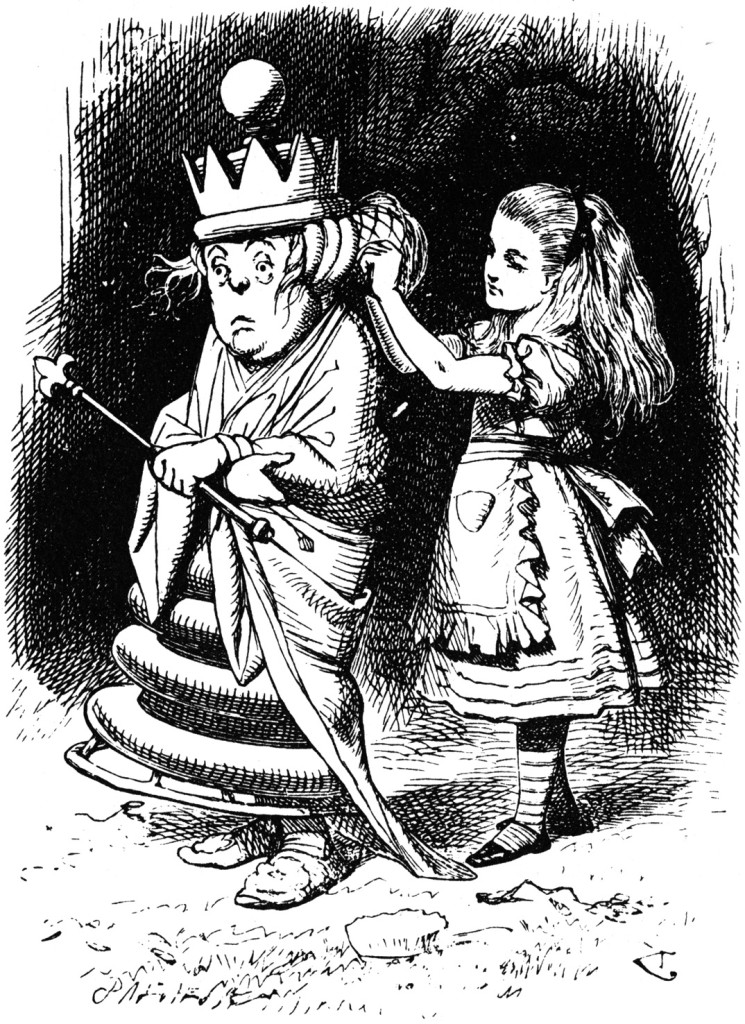Adam Gopnik of The New Yorker makes great use of Lewis Carroll’s White Queen in writing about New York’s blizzard-that-wasn’t. I’m talking about the snowstorm that didn’t happen this past Tuesday.
Just talking this way already indicates how the situation invites comparisons with Carroll’s Looking Glass world. Gopnik then very cleverly uses Carroll’s reversals to make an even broader point about how, thanks to the media, we spend a lot of time getting worked up over potential crises and scandals, only to act (if they fail to materialize) as though we had been calm all along.
Gopnik associates the White Queen with Hans Christian Andersen’s Snow Queen before labeling the former as ruler of “the Kingdom of the Snow That Fell Before It Started Falling.” He sets up the parallel by quoting instances of the media hysteria that preceded the non-storm:
“In New York City, the latest National Weather Service update hints a bit more strongly that this storm could over perform there, saying, ‘It should be a raging blizzard,’ ” read one report. It continued, “Although official forecasts say 20-30 inches for the city, a top-end scenario of three feet is still possible, which could break the city’s all-time single storm snowfall record (dating back to 1869) by 5 to 10 inches.” The report said that the N.W.S. office in Boston warned that the storm’s “central pressure will explosively deepen on Tuesday, at a rate twice that of a ‘bomb’ cyclone.” One N.W.S. forecaster said, “It’s bombogenesis, baby!” The storm was called “historic” and “crippling.” And “explosively deepening”—this is snow porn, of course, and for some reason it excites us. We like the Armageddon until it’s here.
The actuality in New York (although not in Boston) was closer to what a rabbinical student says in an Isaac Bashevis Singer short story that Gopnik quotes:
Snow comes from heaven, and brings us the peace of a better world.
Here’s the scene with the White Queen:
The Queen began screaming so loud that she had to leave the sentence unfinished. “Oh, oh, oh!” shouted the Queen, shaking her hand about as if she wanted to shake it off. “My finger’s bleeding! Oh, oh, oh, oh!”
Her screams were so exactly like the whistle of a steam engine, that Alice had to hold both her hands over her ears.
“What IS the matter?” she said, as soon as there was a chance of making her heard. “Have you pricked your finger?”
“I haven’t pricked it YET,” the Queen said, “but I soon shall—oh, oh, oh!”
‘When do you expect to do it?’ Alice asked, feeling very much inclined to laugh.
‘When I fasten my shawl again,’ the poor Queen groaned out: ‘the brooch will come undone directly. Oh, oh!’ As she said the words the brooch flew open, and the Queen clutched wildly at it, and tried to clasp it again.
Then the crisis occurs:
‘Take care!’ cried Alice. ‘You’re holding it all crooked!’ And she caught at the brooch; but it was too late: the pin had slipped, and the Queen had pricked her finger.
‘That accounts for the bleeding, you see,’ she said to Alice with a smile. ‘Now you understand the way things happen here.’
“But why don’t you scream now?” Alice asked, holding her hands ready to put over her ears again.
“Why, I’ve done all the screaming already,” said the Queen. “What would be the good of having it all over again?”
After quoting Carroll, Gopnik moves on to media behavior and our responses generally:
The Queen’s final remark is the motto of the modern American media, apropos of pretty much anything. We get hysterical at first, and by the time the snow explosions don’t take place, or it emerges, say, that Benghazi isn’t a scandal, or we experience the American Ebola epidemic that never happened—Why, We’ve Done All the Screaming Already! With our doom prophets, no one even recalls the snow warning that went wrong, the super predators who didn’t appear.
And further on:
We live … every morning[ ] in the White Queen’s Kingdom.
Gopnik points out that, unlike the case with many of our hysterical forecasts, the White Queen’s finger actually bleeds. Also unlike us,
at least the White Queen knows that she is having the emotions in the wrong sequence.


